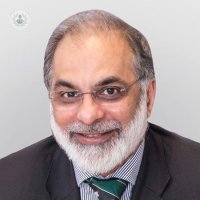Gastroscopy explained: What to expect, risks, and recovery
Written by:In his latest online article, Mr Muhammad Hanif Shiwani gives us his insight into gastroscopy. He talks about the purpose of the gastroscopy procedure, if it’s a painful or uncomfortable procedure, potential risks, complications and recovery.

What is the purpose of a gastroscopy procedure?
Gastroscopy primarily serves as a diagnostic procedure aimed at assessing symptoms and identifying diseases within the gastrointestinal tract. While occasionally used for therapeutic purposes, the procedure predominantly focuses on diagnosis in my practice. When patients present symptoms concerning their gullet or stomach, the endoscopic examination is conducted to rule out severe illnesses and pinpoint any conditions. This enables the collection of samples and biopsies for subsequent treatment. Essentially, it functions as both a diagnostic and, to a lesser extent, a therapeutic procedure, with emphasis on diagnosis in the context of my practice.
Is gastroscopy a painful or uncomfortable procedure?
Gastroscopy can be performed in three different ways. One approach involves numbing the throat and inserting the camera through the mouth into the gullet, allowing for an examination of the area. The second method includes administering pain relief and sedation, typically through an intravenous drip, inducing a mildly sedated state without complete unconsciousness. This sedation is designed to relieve anxiety and enhance comfort, often likened to the effects of a mild tranquiliser, ensuring a more relaxed experience.
While the procedure isn't carried out under general anaesthesia, it aims to calm patients and increase their comfort. Some discomfort might occur as the camera passes through the throat, leading to a sensation of slight bloating and pressure in the stomach. Following the procedure, individuals might experience temporary throat discomfort, which usually resolves within a few hours. Essentially, the procedure isn't inherently painful but can cause some discomfort. However, heightened anxiety in patients can lead to panicking and inadvertently causing more discomfort or pain, potentially resulting in complications.
What are the potential risks and complications associated with gastroscopy?
To ensure formal compliance, I typically review a checklist that includes a consent form which all patients sign after thoroughly reading about the potential complications. When used for diagnostic purposes, the risk of complications are very low, typically at one in a thousand cases. These complications may involve instances such as bleeding, accidental perforation of the gullet or stomach, minor dental injury, or a sore throat. It's crucial to understand that in diagnostic procedures, there's a slim chance of missing a diagnosis, pathology, or abnormality, or the procedure might be incomplete. Consequently, the samples collected may not precisely represent the disease observed, occasionally necessitating a follow-up procedure.
Regarding sedation, it's important to note that it carries a potential risk of affecting breathing. Hence, for patients with breathing issues, like those with sleep apnoea, we tend to avoid sedation and opt for using only local anaesthetic spray.
How long does it take to recover after gastroscopy?
The recovery process after a gastroscopy differs depending on whether local anaesthetic spray or sedation is used. If local anaesthetic is administered, the effects typically wear off within an hour, allowing patients to return to normal activities. However, in the case of sedation, it's crucial that someone accompanies the patient and looks after them for 24 hours as sedation can impair decision-making, leading to potentially inappropriate choices. We strongly advise patients who have undergone sedation not to drive, make critical decisions, or operate machinery for 24 hours. Generally, we recommend not returning to work for 24 hours following the procedure, which could potentially result in a two-day absence from work if sedation was used.
Recovery time, potential risks, and preparation for a gastroscopy are important considerations. Patients are informed in advance and usually instructed to fast for four to six hours before the appointment. This ensures an empty stomach, minimising the risk of vomiting, which could lead to aspiration. Aspiration occurs when stomach contents enter the lungs, potentially causing chest-related issues such as infection, coughing, or pneumonia. To reduce this risk, patients on blood-thinning medication may have some of these medications stopped on the day of the procedure, depending on the type of blood thinner they're taking.
For diagnostic purposes, the adjustment of blood-thinning medication depends on the specific type of medication taken. In therapeutic endoscopy, blood-thinning tablets may be paused for a few days prior to the procedure.
Mr Muhammad Hanif Shiwani is an esteemed general and laparoscopic surgeon with over 25 years of experience. You can schedule an appointment with Mr Shiwani on his Top Doctors profile.


